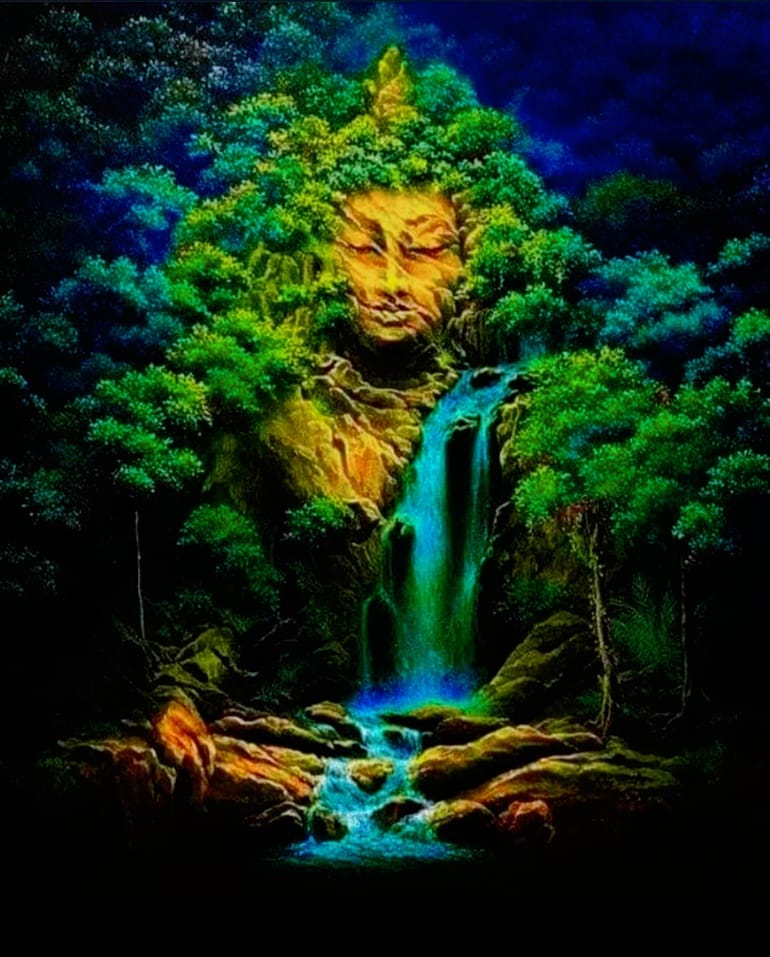Egoism or Economy: Holiness or Sin?
The word economy is derived from the Greek word oikos (home/eco) plus nomos (norm/law). The Japanese word keizai is the shortened form of Keisei-saimin (ruling the world to save people). Our modern economy is a pyramidal structure with a few rich people and masses of poor people, which causes individual, social, and ecological sufferings such as starvation, division, catastrophe, etc.
The cause is that oikos is taken as an individual home, in which we prioritize individual assets most, while ignoring our ecological home, in which we could preserve ecological integrity . In the former we are severed into sin (sick separation), as in other human politics, society, and culture, while in the latter we are hallowed in holiness (wholesome whole), as in the original ecological system in harmony as a whole.
The solution is to reverse the human fallacy of an extreme expansion of the individual self, in which we ignore the original holy harmony, health, and happiness, to regain the ecological interrelated integrity with peace, equality, freedom, and friendship, carrying this into human politics, society, and culture and with other species and ecological systems as well.
The Buddha had no private economic property, political power, social position, or cultural prejudice, but lived in holiness without sin. Capitalism creates class, etc.; communism corrupts into dictatorship, etc. We must be awakened to our karmic sin and return to the Dharma holiness by constant cultivation, concern, communication, and cooperation.
July 19, 2024 C.E.
Note:
- The Japanese keisei-saimin seems to fit political economy in the original sense of politics as the way to benefit polis (city and citizens), which was the original meaning of classic economics to study the relationship between politics and economy.
- Karma is instilled with the triple poisons of desire, divisiveness, and delusion (of ego/mei: I/my). The Buddha said that all living beings are karma-birthed, -heirs, -owners, -machines, and -refuged. He clarified that there is no self-substance with self-sameness (permanent) and self-sovereignty (wishful) entities due to the Dharma (Truth/Law) of all dharmas (phenomena), Dependent Co-origination. We as karma-machines must change to the Dharma-refuged in order to change the world in suffering to that in holiness (wholly wholesome: harmonious, healthy, and happy).
- Dharma means 1. form (from d-harm: phenomenon) and 2. norm (from d-h-arm: norm: law operating through phenomena: ethic), and 3. the teaching of the law of all phenomena, that is, Dependent Co-origination (originally awakened on the origination of perception/consciousness depending on the sense organs and objects, but later applied to all phenomena, cf. note 5). This law is similar to the law of causality, now used by sciences, but deeper and wider, applied beyond objects – more on subjects and symbols – ideas, etc.).
- “The Dharma (Norm/Law/Truth/Ethic) of all dharmas (forms/phenomena/ truths/ethics)” is Dependent Co-origination, i.e., all phenomena are interdependently co-originated on limitless causes and conditions (similar to the Law of Causality, but deeper and wider – beyond conventions, conceptions, objects, etc.). This means that we are interrelated with other beings (other species, elements, stars, etc.), and relatives to each other, and that we must therefore live together harmoniously and strive to make a wholly wholesome world to become harmonious, health, and happy.
- A paradigm shift from our artificial, unilateral pyramidal civilization to a natural, cyclical Indra-net life culture for sharing life, heart, and harmony with the five blisses (awakening, freedom, equality, friendship, and peace) is essential to solve the global problematique. Culture is the cultivation of our potential in truth, goodness, beauty, and holiness (cf. sciences, philosophies, arts, and religions).
Please refer to the following for more detailed explanation:
利己主義か経済か:聖か罪か?
経済という言葉はギリシャ語のoikos (家/生系) に nomos(規則/法則)を加えたものに由来する。日本語の経済は経世済民(世を治め民を救う)の略語である。私達の現在の経済は少数の金持ちと多数の貧乏人の金字塔構造で、飢餓、分断、破綻などの個人的、社会的、生態的苦を起こしている。
その原因はoikos を個人の家と取り、そこでは個人の資産を最も優先し、私達の生態的統一性を保持することの出来る生態的家郷を無視しているからである。前者は他の人間の政治、社会、文化におけると同様にわたしたちは 罪(病患分離)に分断され、後者では、全体として調和した本来の生態的組織に於けるように私達は聖(健全全体)に崇敬される。
解決は、本来の聖なる調和、健康、幸福を無視した個人我の極端な拡大という人間の過誤を、平和、平等、自由、友情のある生態的に相互関連した統一性を取り戻し、これを人間の政治、社会、文化に齎し、他生物や生態系と共に、反転させることにある。
ブッダ(覚者)は如何なる私的な経済的財、政治的権力、社旗的地位、文化的偏見も持たず、罪なく聖に生きた。資本主義は階級などを生み、共産主義は腐敗して独裁等になる。私達は常時の修養、関心、意思疎通と共同により自らの業の罪に目覚めて法の聖に再帰しなければならない。
2024共通年7月19日
註:
- 1.日本語の経世済民は、politics(政治)の本来のであるpolis (都市と市民) を益する道の意味でのpolitical economy (政治経済学)に該当する様であるが、これは政治と経済の関係を研究するものであった古典経済学を意味する。
- 業は貪瞋(エゴ/メイ:我/我所の)痴の三毒が植え込まれている。ブッダ(覚者)は一切衆生は業—誕生者、—相続者、—所有者、—機械、—依拠者であると言った。彼は、諸法(現象)の法(真理/倫理)である縁起の故に自己同一(永住)と自己主宰(意欲通り)の実態をもった自己物質は存在しないことを明らかにした。業—機械である私達は、苦しむ世界を聖(全体健全:調和、健康、幸福)なる世界に変える為には、法₋依拠者にならなければならない。
- 法(dharma)は 形態(form: d-harmより: 現象:真理)、2.規則(norm: d-h-armより:現象中の規則:倫理)、3.諸法の法、縁起(元来は感覚器官と感覚対象に依る知覚・意識の発生に覚醒したが後に一切現象に適用されたもの。註5参照)。この法則は、現今諸科学に用いられる、因果律と同様であるが、もっと深く広い-客体を越えて主体と観念などの象徴に適用される。
- 諸法(形態・現象)の法(規則・法則・真理・倫理)は縁起(因縁生起)、即ち、一切現象は無量の直接原因と間接条件により相依生起するということである(因果則に似ているがさらに深く広い-世俗、観念、対象などを超える)。これは私達が他者(多種、要素、星宿など)と相依関係にあることを意味し、相互に相対的であり、私達が調和、健康、幸福になる為には共に調和して生き、全体健全な世界を作る努力をしなければならないことを意味する。
- 私達の人工的で一方向の金字塔文明から命・心・和の分かち合いによる五福(覚醒、自由、平等、友情、平和)をもつ自然的で循環的な命帝網文化への枠組転換が地球問題群を解決する為には必須である。文化は私達の真善美聖(参考:諸科学、諸哲学、諸芸術、諸宗教)における潜在能力を修養することである。
詳細説明は下記を参照:
..
.
.
.
.
.
.
.
.
.
.
.
.

